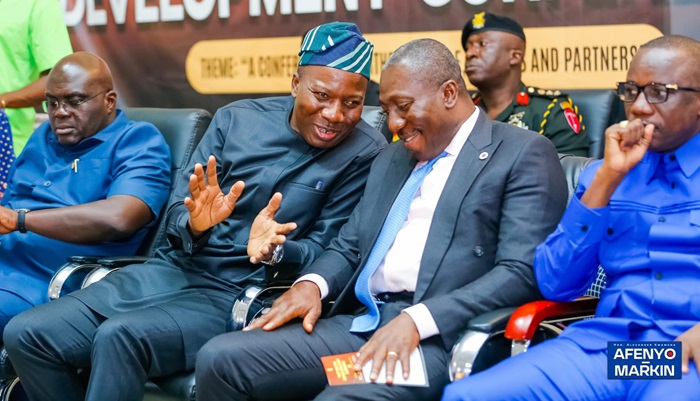Northern Members of Parliament and traditional leaders have called on government and development agencies to take concrete steps to improve agro-processing, roads, and education across the five northern regions, saying these are crucial to tackling poverty and improving living conditions.
The call was made at the Northern Development Conference held in Tamale on Monday, July 21, 2025.
The meeting, under the theme “A Conference of Northern People, Leaders and Partners,” brought together chiefs, political figures, civil servants, and representatives of development organisations to discuss coordinated responses to the region’s long-standing challenges.
Speaking at the event, the Minority Leader, Mr Alexander Kwamina Afenyo-Markin, described northern Ghana as the country’s breadbasket, noting that it contributes over 40 percent of the national food supply.
He said the region’s agricultural potential remains underutilised due to poor road networks, lack of processing centres, and limited investment in local industries.
“We must move beyond declarations and take bold steps to unlock the North’s full potential,” Mr Afenyo-Markin said.
“This means investing in roads, schools, agro-processing, energy, and health systems. We owe it to the people who have long been left behind.”
He also referenced the formation of the Northern Caucus in Parliament, describing it as a major step forward. The caucus, inaugurated by the Speaker of Parliament, Mr Alban Sumana Kingsford Bagbin, brings together 57 MPs from the Upper West, Savannah, Northern, North East, and Upper East regions, across political lines.
According to Mr Afenyo-Markin, the group will serve as a platform to advocate for policies and funding that reflect the region’s real needs.
The Majority Leader and Member of Parliament for Bawku Central, Mr Mahama Ayariga, also addressed the gathering. He called for practical development targets backed by timelines, saying the people of the north have heard many promises over the years without results.
“We are not here for another talk shop,” Mr Ayariga said. “We must turn these discussions into practical action with clear timelines and proper follow-up.”
Mr Ayariga referenced past attempts to close the north-south development gap, including President Kwame Nkrumah’s Seven-Year Development Plan, the Savannah Accelerated Development Authority under President John Evans Atta Mills, and the One District, One Factory initiative under President Nana Addo Dankwa Akufo-Addo.
He said despite these initiatives, many parts of northern Ghana still face poor infrastructure, limited access to education, and weak health systems.
He said the newly formed caucus must act as a strong voice in Parliament to push for fair distribution of resources and demand projects that can create employment and improve public services.
“We must use our numbers and experience to improve lives. This includes lobbying for budget allocations that meet the actual needs of our people,” he added.
Among those present were Mr. Julius Debrah, who represented President John Dramani Mahama, and senior civil servants, regional ministers, traditional leaders, and representatives of development organisations.
Discussions during the conference touched on a range of persistent issues, including poverty rates of up to 80 percent in some communities, poor access to water and electricity, low school enrolment, and recurring disputes over chieftaincy and ethnicity that continue to hamper development.
At the end of the event, participants made a collective appeal to traditional authorities, political leaders, private investors, and development partners to support efforts to lift the northern regions out of poverty. Proposals included creating jobs through agriculture with value addition, building more schools and health facilities, and establishing long-term measures to promote peace in areas affected by conflict.
Mr Afenyo-Markin, who closed the conference, urged stakeholders to abandon what he called empty promises. “We can no longer afford piecemeal solutions,” he said. “With honesty, proper planning and follow-through, the North can move forward. This is not just about the northern regions. It is about building a stronger Ghana for everyone.”

